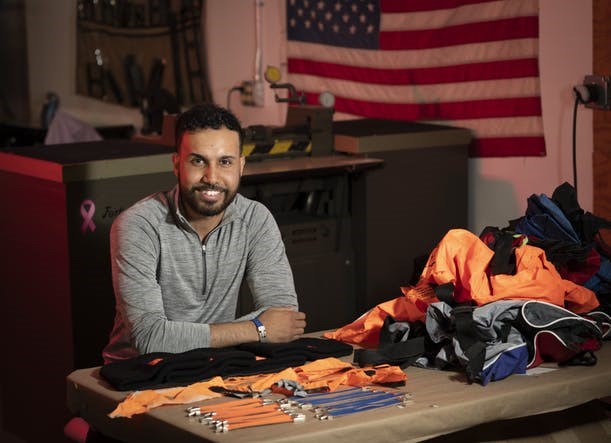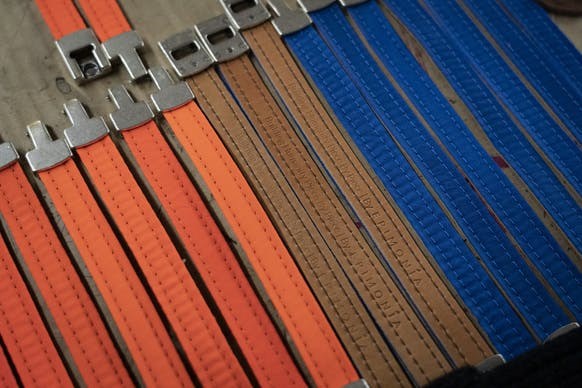
Wednesday December 18, 2019
By Reid Forgrave 
Mohamed Malim, 23, founded a company called Epimonia that makes bracelets and hats out of repurposed life jackets the refugees have likely used during boat trips to Greece./RENÉE JONES SCHNEIDER •
Material in bracelets went through a lot, and so did the people who wore them.
Mohamed Malim pulls the bright orange liner of a life jacket out of a big box, recently shipped to Minnesota from Greece. This one has “CARIBBEAN GALAXI” printed in faded block letters. He pulls out another with “CHILD” printed on it.
Inside the box are 39 more. Some are ripped; all are well worn. Eight of those are sized for babies, which — given that they came from refugees who made the perilous boat trip from Africa to Greece — is heartbreaking.
Malim sorts them by color, careful to not remove signs of wear and tear. He needs that for what he’s doing: cutting them up and turning them into fashionable leather-lined bracelets, or tagging them onto the front of a knit cap.
“We want to see the wear marks,” said Peng Cha, who works with Malim. “If it’s sun-worn and faded, we want that to be in the fashion pieces to help tell the story. That’s the powerful part of the bracelets themselves, that these are worn pieces. There’s dirt on them. They’ve gone through a lot.”
To put it another way, Malim said, “You’re wearing someone’s journey. It’s basically saying, ‘I stand with you.’ ”

Bracelets made of repurposed life jackets the refugees have likely used during boat trips to Greece, photographed in Maplewood, Minn., on Tuesday, November 26, 2019.
RENEE JONES SCHNEIDER
That’s the message of the company the 23-year-old started last year, as a college senior. The company is called Epimonia (epimonia.com), whose root means “perseverance” in Greek.
“When a refugee is fleeing their country, they’re going through so many challenges,” Malim said. “The life jackets represent the struggles and the perseverance. They symbolize hope. When someone’s on that boat, all he’s thinking about is survival. They come to a new country with hope and a dream.”
Making a difference
Born to Somali parents in the giant Dadaab Refugee Complex in Kenya, he moved to Minnesota when he was 5.
The oldest of six, he was often in charge of translating for his parents at doctors’ appointments, paying bills and reading the mail. At school, he was a high achiever in a competitive environment filled with many students whose parents are well off and well educated.
“He was one of our superstars,” said Kathleen MacLennan, access coordinator at Edina High School. “He was mature beyond his years, even in high school. He was very polished even then, and he really had goals.”
He was an athlete, too, good enough in track and field to make the team at the University of St. Thomas, where he was a business and entrepreneurship major.
A couple of years ago, he was watching the news when he saw a story about the refugee crisis in Europe. One image stuck with him: hundreds of life jackets strewn on the Grecian shores.
Though Malim didn’t make that dangerous journey (his family entered the country legally), he wondered how he could turn those life jackets into something good. He contacted about 50 nonprofits in Greece before one committed to shipping him life jacket liners. And his company was born.
So far, he’s sold about 4,000 bracelets at $40 a pop. Epimonia also sells other fashion goods: tote bags and beanies, T-shirts and ball caps. He’s made about $110,000 in revenue to date, mostly online. His goal for 2020 is to increase sales by getting into boutiques and smaller stores.
Aiming higher
He has a bigger goal than simply to grow his business, however: It’s to spread his message and continue to support refugees.
Malim has pledged to donate half his profits to causes that are common to refugees. For instance, bracelets made from orange life jackets support job training, while ones made from blue life jackets support scholarships.
His company helps pay for citizenship applications, and he also sends donations to the nonprofit that ships him the jacket liners, Refugee4Refugees, which supports refugees who seek asylum on the Greek islands of Lesbos and Samos.
MacLennan, for one, wasn’t surprised by his insistence on helping others.
“He just has that value of giving back,” she said. “That whole story of how his family got here — they got lucky and their name was pulled from the lottery — he’s always seemed focused on giving back.”
“If I can make a difference in one refugee’s life,” said Malim, “that’s a dream come true.”
Telling a story
Epimonia is equal parts down-home Minnesotan and mind-bogglingly global.
Its small contract manufacturing facility in Maplewood is inside one of the oldest dairy barns in the state. It was launched by a Hmong refugee decades ago.
“That’s the link between us,” said Cha, who runs Malim’s manufacturer, Home Based Industries. Cha’s parents were Hmong refugees who came to the United States after the Vietnam War, during which his father was a soldier. “We’re both from that same vein of people who came here for a better life, to have an opportunity to make something of ourselves.”
Cha and his employees cut each life jacket liner into panels. A strip of the life jackets is sewn to a leather band; on the other side of the band is printed Epimonia’s slogan: “Building Humanity Piece by Piece.”
A political element
Malim is aware that the refugee issue has become more politically loaded in recent years.
The Trump administration has shrunk the number of resettled refugees to 18,000 in 2020, the lowest number the United States has admitted since 1980, when Congress created the refugee resettlement program. That’s down from the limit of 110,000 refugees that Barack Obama set during his final year in office. It comes at a time when the world refugee population is at its highest since World War II.
And he’s not naive enough to think one fluorescent orange bracelet will immediately change someone’s mind about the U.S. role in the world refugee crisis. But he does hope it can start a conversation.
“I want a product that’s noticeable, a color that pops,” Malim said. “Having that conversation is the ultimate goal. These are people like me and you who want to contribute to society and get a decent life for their kids.
“What if you were in that boat? What if your family had to flee a civil war? How would you feel?” he asked. “Put yourself in that situation for one second. Refugees, they didn’t choose to be a refugee. For me it was a forced thing from a civil war. You can’t control that kind of stuff.
“These bracelets are the first step of creating empathy.”